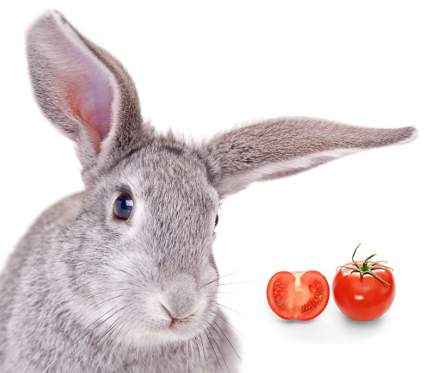Tomato salad is a classic of traditional Brazilian cuisine, which can be accompanied by lettuce, onion, carrot and other vegetables. In addition to bringing a fresh touch to the dishes, tomato is a fruit (although it can be confused with a vegetable) that offers many health benefits, mainly due to its high content of natural antioxidants.
However, when it comes to pet nutrition, tomatoes are a highly controversial food. On the one hand, there are those who argue that it is safe and healthy to give tomatoes to dogs. However, on the other hand, it is possible to find someone who says tomatoes are a poison to dogs and can seriously harm canine health. But who’s right? After all, can dogs eat tomatoes or not?
- This seemingly contradictory information has led many keepers to question whether dogs can eat raw tomatoes.
- Tomato sauce and other recipes containing this food.
- To clarify these doubts and offer more quality information that will help you provide a healthy diet to your dog.
- In this new article of Animal Expert we will explain if the tomato is really bad for dogs or if you can incorporate this food into your dog’s diet by taking precautions.
Mature tomatoes without seeds are not poisonous to dogs. On the contrary, it is a highly nutritious food, which provides vitamins, minerals, fiber, natural antioxidants and a good amount of water. Therefore, it helps to strengthen the immune system of dogs, prevent various health problems and keep the dog’s body well hydrated.
However, green tomatoes contain a chemical compound called glycoalkaloid that is toxic to dogs. So, if you’ve ever wondered if a dog can eat green tomatoes or if it’s not fully ripe, the answer is no, because it may have digestive problems, such as diarrhea, gas and vomiting. In more severe cases, when the dog swallows a large amount of green tomatoes, symptoms of poisoning may appear.
The same compound is also present in most of the green parts of the plant that gives the tomato as fruit (Lycopersicon spp), as in the leaves and stems. Therefore, your dog should never eat green tomatoes or green parts of the tomato plant. So, if you plant tomatoes in the garden or in an orchard in your home, remember to limit your dog’s access to this space.
Mature tomatoes contain natural antioxidants, such as vitamin C and lipocarotenos, that combat the action of free radicals in the dog’s body and the resulting cellular damage. This antioxidant effect is particularly beneficial for older dogs as they help prevent symptoms of old age and help maintain a stable metabolism.
They also contain vitamins A and B, which help strengthen the immune system and prevent the most common diseases in dogs. Vitamin A (and especially beta-carotene) are good allies for good eyesight and healthy skin of dogs, helping to prevent dermatological problems, such as canine dermatitis.
In addition, the ripe tomato adds fiber to the dog’s diet, having a positive impact on the digestive process by promoting intestinal transit and avoiding constipation in dogs.
Finally, tomatoes also provide a good water supply, which helps prevent dehydration that can promote the development of urinary tract disorders, such as urinary tract infections. In addition, the intake of liquid-rich foods has a diuretic and purifying effect on the dog’s body, helping to eliminate toxins and maintain excellent kidney activity.
Yes! But don’t forget to always offer your dog ripe tomatoes without seeds, never green tomatoes or parts of the tomato plant. Your dog can eat cherry, round and even other varieties, as long as they are fully ripe. Also, wash fruits and vegetables thoroughly before giving them to your pet to remove impurities and microorganisms that may adhere to the skin or skin of these foods.
Also remember that if fruits and vegetables contain several essential nutrients, they cannot form the basis of your dog’s diet. Dogs need to consume a good dose of protein and fatty acids (so-called “good fats”) to strengthen their muscles and maintain an active metabolism. Although it has become omnivorous, meat remains the source of proteins with better digestibility and greater nutritional utility for dogs.
Therefore, it is not advisable to offer your pet a vegetarian or vegan diet, which is based solely on vegetables, legumes, fruits and proteins of plant origin, as this could lead to serious nutritional deficiencies and anemia cause in dogs.
That depends! Your dog will be able to eat a homemade and natural tomato sauce, which is prepared without the addition of salt, preservatives and spices that can be harmful to their health. However, you shouldn’t give your best friend industrial or synthetic tomato sauce, as these products contain artificial preservatives and additives that can cause digestive problems.
A good idea to prepare a nutritious dish that your best friend will like is to make a homemade tomato sauce with meat or chicken and serve it with pasta or brown rice. In this way, the vitamins and fibers of the tomato are added to the meat proteins and carbohydrates of the paste.
In addition, you can use pieces of ripe and raw tomatoes as a positive reinforcement in your puppy’s education. Whenever your dog adopts positive behavior or reproduces a canine obedience order, you can offer a piece of ripe, seedless tomato to reward you and encourage you to continue learning.
Watch our YouTube video about 8 fruits dogs can eat, their benefits and dosages:
If you want to read articles similar to Can a dog eat tomatoes ?, we recommend that you visit our Balanced Diets section.

